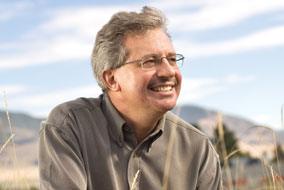
UBC Okanagan social geographer Jose Carlos Teixeira - photo by Martin Dee UBC Reports | Vol. 51 | No. 10 | Oct. 6, 2005
UBC Okanagan Geographer Earns Portugal’s Highest Honour
By Bud Mortenson
“My father asked what my plans were and I told him I wanted to go to the Americas.” It was 1978, and a young Jose Carlos Teixeira was about to leave the archipelago of the Azores. Many from these nine islands, a thousand windswept miles west of the Portuguese mainland, went
somewhere else to chase their dreams.
“You had no choice,” he recalls. “You had to emigrate.” Emigrés would revisit the islands with tales of a larger world and new horizons that excited him with possibilities. Teixeira became a social geographer passionate about studying the migration of ethnic groups and how they shape their communities. On Oct. 15, this UBC Okanagan assistant professor will receive Portugal’s highest civilian award, the Ordem do Infante D. Henrique -- Portugal’s equivalent to the Order of Canada -- for his contributions to the Portuguese community abroad.
It’s a big community. Take the Azores alone -- about 250,000 people live on the islands, but another 1.5 million Azorians live in North America. Teixeira soon joined a growing number of expatriates in Canada. Three aunts and an uncle had settled in Montreal and he found himself living in that city’s Latin Quarter.
“I was living in the port of entry for Montreal. I felt at home -- fortunate to live, eat, shop in a very ethnic part of Montreal. It shaped my way of viewing and experiencing the city,” he says.
His time in the Latin Quarter’s immigrant neighbourhoods raised questions central to his work ever since. “I wanted to know how they affected the internal structure of our cities. I was interested in the evolution, growth and decline of some of these neighbourhoods,” he explains.
Teixeira believes being part of the communities he studied -- a geographer in the field -- gives him valuable perspective as a teacher.
“It’s relatively easy for me to translate this experience to my students because I lived it,” he says. “I saw the communities decline and grow.”
From Montreal, he moved to Toronto where he completed a PhD in urban social geography.
It didn’t take long for him to gravitate to the city’s Kensington Market area.
“Kensington Market was an ethnic island. It was -- and still is to some degree -- the United Nations of the world,” he says, affection for this part of Toronto evident in his tone. Two years ago, he nominated Kensington Market to become a national historic site. He expects that nomination to be approved later this year by the federal Ministry of Environment.
Over the past century, Kensington Market has seen many transitions. Just when it appears to be on the wane, “suddenly you have another wave of immigrants and life is rejuvenated,” says Teixeira. The latest wave? A decidedly up-market trend -- “it’s somewhat gentrified with more upper-class, white-collar people,” he says. “They are bringing more life and vitality to the area.”
And while the area is morphing into something new yet again, Teixeira says that’s key to long-term salvation for this historic neighbourhood. “It will become more trendy when it is a national historic site. That will preserve it. It has the history behind it and nobody can take it from that neighbourhood. I felt a richer Canadian, a richer Torontonian, any time I did a field trip to Kensington Market.”
Since arriving in the Okanagan in early 2004, he has been researching the Portuguese in the southern reaches of the valley -- Penticton, Oliver and Osoyoos. “Now I want to look at the temporary migrants and other immigrant groups that have left their imprint on the South Okanagan,” he says.
The Okanagan and UBC have both impressed Teixeira. “We are in a small paradise and UBC is in a great position to attract more students, including international students. All the ingredients are here,” he says. “We are one of the best institutions in North America, and students know that. We have the location in this beautiful valley, with the lakes and mountains -- you can do a thousand things here.”
Teixeira turns 46 just three days after receiving the Ordem do Infante D. Henrique. Most of those invested into this order are much older, but Teixeira sees the honour as a call to do even more with the rest of his life’s work.
“I am relatively young to receive it -- and I see it as an incentive to work harder and harder. I will continue working to promote my group and research the rich tapestry of this country, Canada.” |
